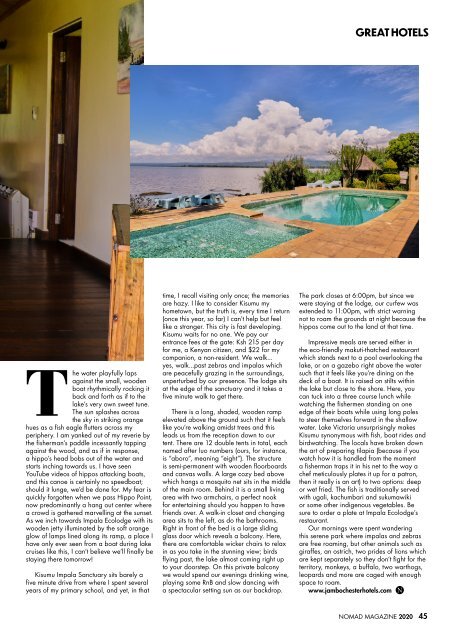You also want an ePaper? Increase the reach of your titles
YUMPU automatically turns print PDFs into web optimized ePapers that Google loves.
GREAT HOTELS<br />
The water playfully laps<br />
against the small, wooden<br />
boat rhythmically rocking it<br />
back and forth as if to the<br />
lake’s very own sweet tune.<br />
The sun splashes across<br />
the sky in striking orange<br />
hues as a fish eagle flutters across my<br />
periphery. I am yanked out of my reverie by<br />
the fisherman’s paddle incessantly tapping<br />
against the wood, and as if in response,<br />
a hippo’s head bobs out of the water and<br />
starts inching towards us. I have seen<br />
YouTube videos of hippos attacking boats,<br />
and this canoe is certainly no speedboat;<br />
should it lunge, we’d be done for. My fear is<br />
quickly forgotten when we pass Hippo Point,<br />
now predominantly a hang out center where<br />
a crowd is gathered marvelling at the sunset.<br />
As we inch towards Impala Ecolodge with its<br />
wooden jetty illuminated by the soft orange<br />
glow of lamps lined along its ramp, a place I<br />
have only ever seen from a boat during lake<br />
cruises like this, I can’t believe we’ll finally be<br />
staying there tomorrow!<br />
Kisumu Impala Sanctuary sits barely a<br />
five minute drive from where I spent several<br />
years of my primary school, and yet, in that<br />
time, I recall visiting only once; the memories<br />
are hazy. I like to consider Kisumu my<br />
hometown, but the truth is, every time I return<br />
(once this year, so far) I can’t help but feel<br />
like a stranger. This city is fast developing.<br />
Kisumu waits for no one. We pay our<br />
entrance fees at the gate: Ksh 215 per day<br />
for me, a Kenyan citizen, and $22 for my<br />
companion, a non-resident. We walk...<br />
yes, walk...past zebras and impalas which<br />
are peacefully grazing in the surroundings,<br />
unperturbed by our presence. The lodge sits<br />
at the edge of the sanctuary and it takes a<br />
five minute walk to get there.<br />
There is a long, shaded, wooden ramp<br />
elevated above the ground such that it feels<br />
like you’re walking amidst trees and this<br />
leads us from the reception down to our<br />
tent. There are 12 double tents in total, each<br />
named after luo numbers (ours, for instance,<br />
is “aboro”, meaning “eight”). The structure<br />
is semi-permanent with wooden floorboards<br />
and canvas walls. A large cozy bed above<br />
which hangs a mosquito net sits in the middle<br />
of the main room. Behind it is a small living<br />
area with two armchairs, a perfect nook<br />
for entertaining should you happen to have<br />
friends over. A walk-in closet and changing<br />
area sits to the left, as do the bathrooms.<br />
Right in front of the bed is a large sliding<br />
glass door which reveals a balcony. Here,<br />
there are comfortable wicker chairs to relax<br />
in as you take in the stunning view; birds<br />
flying past, the lake almost coming right up<br />
to your doorstep. On this private balcony<br />
we would spend our evenings drinking wine,<br />
playing some RnB and slow dancing with<br />
a spectacular setting sun as our backdrop.<br />
The park closes at 6:00pm, but since we<br />
were staying at the lodge, our curfew was<br />
extended to 11:00pm, with strict warning<br />
not to roam the grounds at night because the<br />
hippos come out to the land at that time.<br />
Impressive meals are served either in<br />
the eco-friendly makuti-thatched restaurant<br />
which stands next to a pool overlooking the<br />
lake, or on a gazebo right above the water<br />
such that it feels like you’re dining on the<br />
deck of a boat. It is raised on stilts within<br />
the lake but close to the shore. Here, you<br />
can tuck into a three course lunch while<br />
watching the fishermen standing on one<br />
edge of their boats while using long poles<br />
to steer themselves forward in the shallow<br />
water. Lake Victoria unsurprisingly makes<br />
Kisumu synonymous with fish, boat rides and<br />
birdwatching. The locals have broken down<br />
the art of preparing tilapia (because if you<br />
watch how it is handled from the moment<br />
a fisherman traps it in his net to the way a<br />
chef meticulously plates it up for a patron,<br />
then it really is an art) to two options: deep<br />
or wet fried. The fish is traditionally served<br />
with ugali, kachumbari and sukumawiki<br />
or some other indigenous vegetables. Be<br />
sure to order a plate at Impala Ecolodge’s<br />
restaurant.<br />
Our mornings were spent wandering<br />
this serene park where impalas and zebras<br />
are free roaming, but other animals such as<br />
giraffes, an ostrich, two prides of lions which<br />
are kept separately so they don’t fight for the<br />
territory, monkeys, a buffalo, two warthogs,<br />
leopards and more are caged with enough<br />
space to roam.<br />
www.jambochesterhotels.com<br />
NOMAD MAGAZINE 2020 45

















